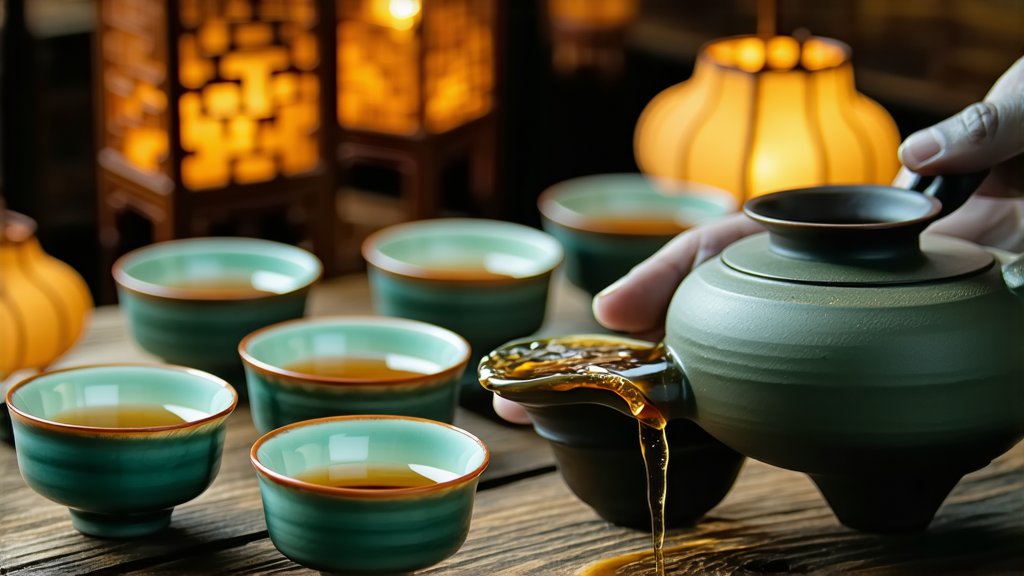
Anhua Dark Tea, a gem within China's vast tea landscape, stands as a testament to the country's rich tea heritage, particularly in the realm of dark teas. This article embarks on a comprehensive exploration of Anhua Dark Tea, delving into its historical roots, varietal distinctions, intricate production processes, and the art of its appreciation, all while maintaining an informative and engaging tone suitable for international readers.
A Historical Tapestry Woven with Tea
The story of Anhua Dark Tea begins in the mountainous region of Anhua County in Hunan Province, where tea has been cultivated for over a millennium. Its origins trace back to the Tang Dynasty (618-907 AD), making it one of the oldest tea-producing areas in China. Initially, these leaves were used primarily for medicinal purposes before evolving into a cherished beverage. By the Ming Dynasty (1368-1644 AD), Anhua had established itself as a key hub for tea trade, with its dark tea gaining popularity across China and beyond.
Diverse Varietals: A Symphony of Flavors
Anhua Dark Tea encompasses several unique varieties, each with its own distinctive characteristics:
-
Qian Zhuang (Thousand Two Cakes): Named after its weight, this traditional form consists of tightly pressed cakes wrapped in bamboo leaves. It undergoes extensive aging, developing complex flavors reminiscent of damp earth, dried fruits, and aged wood.
-
Fu砖茶 (Fuzhuan Brick Tea): Pressed into brick shapes, Fuzhuan tea is known for its robust body and deep, smoky aroma, often described as having notes of camphor and tobacco.
-
Tianjian Tea: Also known as "Sword Tips," Tianjian features long, sword-shaped leaves that are lightly fermented, offering a milder taste compared to other Anhua varieties, with hints of sweetness and floral undertones.
-
Hua Guan (Flower Pot): Shaped like small pots, Hua Guan tea combines the essence of both green and dark teas, resulting in a balanced profile with vegetal and mineral nuances.
Crafting Anhua Dark Tea: A Labor of Love
The production of Anhua Dark Tea is a meticulous process that marries tradition with nature's microbial magic. Here's an overview:
-
Withering: Freshly picked tea leaves undergo a gentle withering process to reduce moisture content, softening the leaves for subsequent steps.
-
Primary Fermentation: Leaves are piled together to initiate microbial activity, which begins the transformation from fresh green leaves to dark brown or black. This stage can last several days to weeks, depending on weather conditions and the desired flavor profile.
-
Secondary Fermentation: After the initial fermentation, the leaves are further processed through repeated piling and turning, enhancing microbial action and deepening the tea's color and flavor complexity.
-
Drying & Packaging: The fully fermented leaves are then dried to halt fermentation and packed into various forms such as cakes, bricks, or pots, ready for aging and eventual consumption.
The Art of Appreciating Anhua Dark Tea
To truly savor Anhua Dark Tea is to engage in a multisensory experience:
-
Visual Examination: Observe the dry leaves for their dark hue and, if applicable, the intricate patterns formed during pressing. Upon infusion, note the rich amber color of the liquor.
-
Aromatic Exploration: Inhale the tea's fragrance before and after brewing. Younger versions may exhibit earthy, vegetal scents, while older teas develop more profound aromas of aged wood, dried fruits, and even medicinal herbs.
-
Savoring the Taste: Sip slowly to appreciate the depth and complexity of flavors. Older Anhua teas typically offer a smooth, velvety texture with layers of earthiness, sweetness, and a lingering finish that reflects their maturity.
-
Texture & Mouthfeel: Pay attention to the tea's body and mouthfeel. Well-aged Anhua tea should feel full-bodied yet not overpowering, leaving a pleasant residue on the palate.
In conclusion, Anhua Dark Tea represents not just a beverage but a cultural artifact steeped in history and tradition. Its journey from leaf to cup embodies the harmony between man and nature, a philosophy deeply ingrained in Chinese culture. As you explore this remarkable tea, remember that each sip offers a glimpse into centuries of craftsmanship and the timeless allure of Anhua Dark Tea.